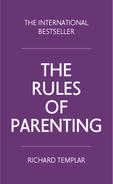RULE 39
Carrots beat sticks
Can you remember being a kid? Go on, think back – of course you can. Now, suppose your teacher said you’d get a gold star/distinction/sweet/pick of the stationery cupboard if you did well in your next spelling test. Now suppose that instead of that, they warned you that if you did badly you’d be kept in at breaktime/given detention/banned from games (or made to do double games, depending on your natural sporting inclinations). Which one of these would make you most likely to do well?
Well, if you were anything like me, you’d have a fat chance of doing well in any spelling test. But I’d certainly have tried harder for the reward. And so would you, if you’re typical. According to modern researchers and child psychologists, carrots are far more effective for encouraging kids to co-operate.
That doesn’t mean that you have to reward your children every time they say please, or pay them for tidying their room. Most of the time they’ll be happy just to know that you’ve noticed their efforts and appreciate them. So let them know: ‘That was a nice thank you’, or ‘Hey, you tidied your room before I’d even asked you to. Brilliant!’ Or, ‘Thanks for being quiet this morning so I could have a lie-in’. Now they’re going to want to do it again so they can get your praise again. It’s vital that they know you’ve noticed, so you have to remember to tell them or it won’t work (and you’ll be woken at 6am next Sunday by the sound of squabbling).
When it comes to bigger stuff that you discuss with them in advance, it’s still important to use carrots and not sticks. Tell them they’ll get their favourite supper if they’re really good in the park, or promise them an increase in their clothing allowance if they keep their room tidy for a whole month.
That’s not to say that sticks don’t have their place (metaphorically, obviously), but in an ideal world they’d be in the background and never get used. They’re for serious lapses of behaviour but, even so, they should always be used in conjunction with carrots. So you can tell your teenager that if they keep coming home late they’ll be grounded for a weekend, but if they make it home by the agreed time for a whole month you’ll extend the curfew by 15 minutes.
Just one word of warning here (mustn’t make it too easy for you). Beware of putting too much pressure on your kids by offering substantial rewards if your child might not succeed. If you promise them their own car or a share of yours if they get certain A-level results, you’re piling on the pressure. And they’ll end up being punished twice if they don’t make it. Once by feeling they’ve failed, and again by not having a car to drive.
IT’S VITAL THAT THEY
KNOW YOU’VE NOTICED,
SO YOU HAVE TO
REMEMBER TO
TELL THEM
